Related Research Articles
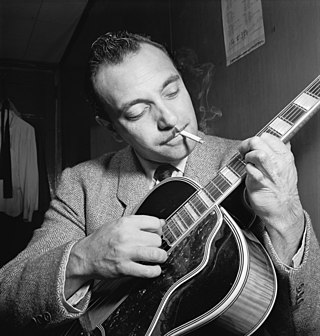
Jean Reinhardt, known by his Romani nickname Django, was a Belgian Manouche or Sinti jazz guitarist and composer. He was one of the first major jazz talents to emerge in Europe and has been hailed as one of its most significant exponents.

Jazz guitar may refer to either a type of electric guitar or a guitar playing style in jazz, using electric amplification to increase the volume of acoustic guitars.

Stéphane Grappelli was a French jazz violinist. He is best known as a founder of the Quintette du Hot Club de France with guitarist Django Reinhardt in 1934. It was one of the first all-string jazz bands. He has been called "the grandfather of jazz violinists" and continued playing concerts around the world well into his eighties.
"In a Sentimental Mood" is a jazz composition by Duke Ellington. He composed the piece in 1935 and recorded it with his orchestra during the same year. Lyrics were written by Manny Kurtz; Ellington's manager Irving Mills gave himself a percentage of the publishing, so the song was credited to all three. Other popular versions in 1935/36 were by Benny Goodman and by Mills Blue Rhythm Band. The opening notes of the song's melody resemble Gershwin's 1926 "Someone To Watch Over Me".

Gypsy jazz is a musical idiom inspired by the Romani jazz guitarist Jean "Django" Reinhardt (1910–1953), in conjunction with the French jazz violinist Stéphane Grappelli (1908–1997), as expressed by their group the Quintette du Hot Club de France. The style has its origins in France and the Manouche clan of Romanis, and has remained popular amongst this clan. Gypsy jazz is often called by the French name "jazz manouche", or alternatively, "manouche jazz" in English-language sources.

For Django is an album by jazz guitarist Joe Pass that contains renditions of compositions famously interpreted by, written about or written for Django Reinhardt.
"Song for My Father" is a composition by Horace Silver. The original version, on the album of the same title by Silver's quintet, was recorded on October 26, 1964. It has become a jazz standard and is probably Silver's best-known composition. According to Silver, the song was "in part inspired by our Brazilian trip. We got the Brazilian rhythm for this tune from that trip, and the melodic line was inspired by some very old Cape Verdean Portuguese folk music."

"Nuages" is one of the best-known compositions by Django Reinhardt. He recorded at least thirteen versions of the tune, which is a jazz standard and a mainstay of the gypsy swing repertoire. English and French lyrics have been added to the piece which was originally an instrumental work. The title translated into English is "Clouds", but the adaptation with English lyrics is titled "It's the Bluest Kind of Blues".
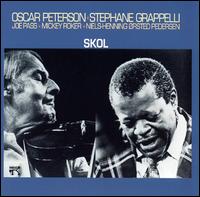
Skol is a 1979 live album by Oscar Peterson, accompanied by Stéphane Grappelli.
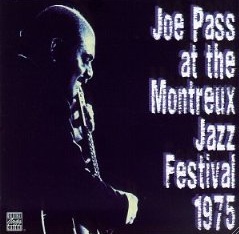
Joe Pass at the Montreux Jazz Festival 1975 is a live album by jazz guitarist Joe Pass that was released in 1975. It was recorded at the Montreux Jazz Festival in 1975.
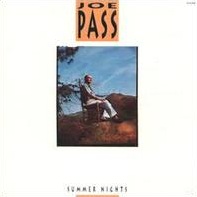
Summer Nights is an album by jazz guitarist Joe Pass, released in 1990.

"Minor Swing" is a gypsy jazz tune composed by Django Reinhardt and Stéphane Grappelli. It was recorded by The Quintet of the Hot Club of France in 1937. It was recorded five other times throughout Reinhardt's career and is considered to be one of his signature compositions.
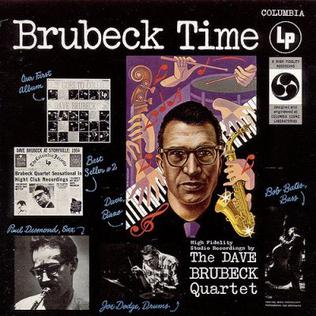
Brubeck Time is a jazz album by The Dave Brubeck Quartet, a rare studio recording from that period of the band, when it was recording mostly live albums. It was recorded in the fall of 1954, and originally released in 1955 under the Columbia label as CL 622. In 1968, Columbia re-channeled the album for stereo and re-released it as Instant Brubeck under the Harmony label as HS 11253. It was later re-released again on CD in 1991 under the title Interchanges '54 as CK 47032, with the addition of four tracks from Jazz: Red Hot and Cool.
Étienne "Sarane" Ferret (1912–1970) was a French musette and gypsy jazz guitarist and composer, a contemporary and musical associate of Django Reinhardt, and the brother of noted Romani guitar players Baro and Matelo Ferret. He recorded with his own quintet in Paris in the 1940s and continued performing there, with occasional recording sessions, until his death in 1970.

Joseph "Nin-Nin" Reinhardt (1912–1982) was the younger brother of guitarist Django Reinhardt and played rhythm guitar on most of Django's pre-war recordings, especially those with the Quintette du Hot Club de France between 1934 and 1939. He was a pioneer of the amplified jazz guitar in France and performed for years on a home-made instrument of his own design.

The Complete Pacific Jazz Joe Pass Quartet Sessions is a compilation album by American jazz guitarist Joe Pass, released on Mosaic Records in 2001. It includes pieces Pass recorded on Pacific Jazz Records in 1963 and 1964.

The Big 3 is an album by vibraphonist Milt Jackson, guitarist Joe Pass and bassist Ray Brown recorded in 1975 and released on the Pablo label.

"Limehouse Blues" is a popular British song written by the London-based duo of Douglas Furber (lyrics) and Philip Braham (music).
"Django" is a 1954 jazz standard written by John Lewis as a tribute to the Belgian-born jazz guitarist Django Reinhardt. It was a signature composition of the Modern Jazz Quartet, of which Lewis was the pianist and musical director.
References
- 1 2 The Best of Joe Pass. Hal Leonard Publishing Corporation. January 2004. ISBN 0-634-05194-6.
- ↑ Williams, Patrick (1998). Django Reinhardt. Editions Parenthèses. p. 182. ISBN 978-2-86364-612-0.